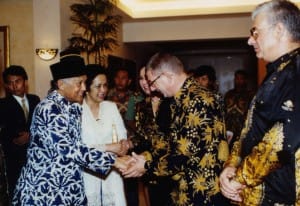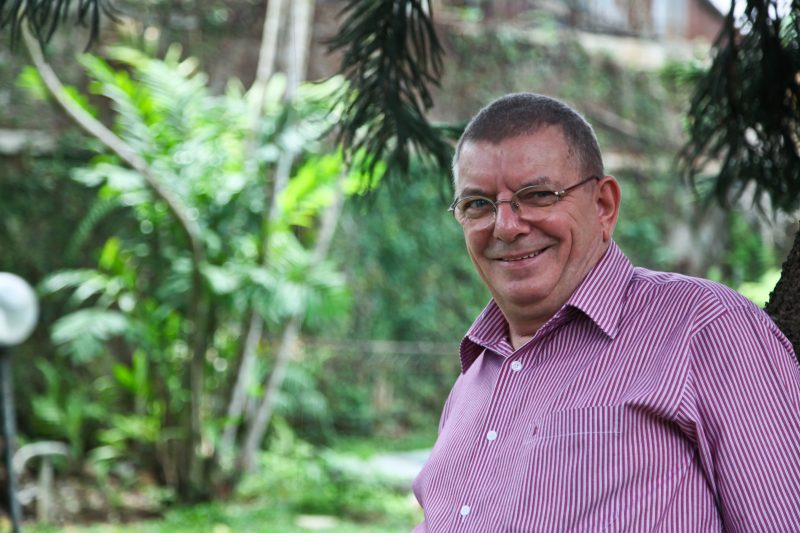Meet Josef Fuchs, an Austrian expat passionate about bringing learning to marginalized children of Indonesia.
Josef has been living in Indonesia for 30 years, and is Founder and Vice President of ISCO Foundation, an NGO dedicated to educating children from slum areas in Jakarta, Medan and Surabaya, as well as developing a progressive method of teaching called ‘Internet of Hearts’, bringing learning to children through social networks and technology.
Josef, you’re originally from Austria. How did you end up on Indonesia’s shores in the first place?
I came here in 1984 with the company Siemens and that was my last assignment with them (I had been working with them since 1976), on a three-month assignment to build up the telecommunications at the then new Cengkareng airport. 30 years later I can say that those three months turned out to be quite long. In 1989, I decided to leave Siemens and went back to Austria to build a company and a school in East Germany, as Germany was just uniting, which was quite successful I must say, and is still running.
When I left Indonesia, I told my friends, “You will see, deregulation of the market will come,” and they all laughed, saying that will never happen because of Suharto’s regime, but in 1995 on the 1st of January, I got a very nice fax from a friend of mine saying: Deregulation has happened – are you coming? On the 5th January, I was on my way to Indonesia to see if this was the time to do something.
In 1999 you founded both your NGO, ISCO Foundation, as well as your telecommunications PT, 1rstWAP. What prompted the beginning of ISCO?
What led to ISCO is something else, because in 1998, Suharto was toppled, Habibie was president and we had all new ministers. One of them was a friend of mine, the Minister of Tourism and Transport. At that time unemployment was skyrocketing and of course, many of the students who were studying at university had to stop because their parents couldn’t afford to pay for them anymore, and that’s when I said we need to do something. I organised a festival, bringing 15 Austrian musicians to Indonesia, and we had an event here that Habibie joined, along with the ministers, and it was a big success. We financed 3,500 students from that one big event. When we started our PT, we knew we had to do something sustainable, to help solve the real problem of the impact of the Asian crisis with education and that’s why ISCO was born.
Educating marginalized children in Indonesia from kindergarten to year 12 is your foundation’s mission. What did you discover when first setting out?
We spent half a year with a psychology professor from France and my partner Pascal Lalanne studying slums. This was where we realized how complex the story is; crime, mafia, alcoholism all plaque these slums, like a government in a different country. Everything that is negative happens there aand we realized that these children have a certain kind of freedom, meaning we have to start much earlier, before they’re on the streets.
We decided to focus on areas and develop them by looking at the demographics first; how many families live in that area, how many children, what is the poverty level, what do they own, income per family member, and so on. Then we decided what the threshold is.
What great work does ISCO do today?
Now we have 29 locations in Jakarta, Surabaya and Medan. The schools we have must be reachable for the kids either by walking or bicycle. We also have to have, in every location, a community house, used in the morning for kindergarten, which is essential but not free in Indonesia. Kindergarten is where they learn to read and write. We use the same community house for the children to do their homework after school, as well as a place that gives the intention to do good. Also very important is to fill up the rest with creating interest through extracurricular activities like sport, music and dancing, and we also teach sex education for the older ones.
Last but not least, we provide family planning support with our female project officers. Indonesian puskesmas is run by men, which women are not happy to open up to, due to their troubled pasts with violence at home. That we cannot change, but we can prevent them from having more children and exacerbating the problem. Our women project officers are trained in family planning, contraception, HIV, and many other things. We also feed the children every day and provide a yearly health checkup. We have also set up a children’s rights organization to help children obtain birth certificates.
That’s very impressive and noble work. You also run a networking night every Wednesday at the Marriot Hotel called Alpenstammtisch International (ASI), where the main motive is to raise awareness about the children you have educated so that they will attain jobs after graduation. Tell us about this.
We started in 2008 and the idea came from the demand itself. This event is very busy every Wednesday and I want to have employers come to these events, which is happening because we guarantee jobs for all the kids. It’s a great atmosphere and I encourage everyone to come along!
I often see children on the streets when they should be at school. How can I help them in this case?
At ISCO, it costs 250 Euro or Rp.4,000,000 per child per year to attend our schools, everything included, because we have low overheads. If you decide you don’t want to give the begging child money but you want to help, then you could give your money to our education program and we will make sure one more child is educated.
How do you gain funds to keep your foundation going?
Funding is all done from my network of big companies’ CSR programs, through donations – without the CSR programs in these big companies, my dream would not be possible. The government is already very positive; we are on top of the list of NGOs already.
What is the next step for you?
We have an incredible situation in Indonesia now where we have a new government and education is on the top of the agenda. I do not sleep at night because of my vision for The Internet of Hearts. How do you build a classroom of two million students? Very easily, with a social network and infrastructure. This is my vision and what I’m pushing very hard at with officials. Indonesia is the perfect example to create this. We can bring learning to children all over the country; to bring the schools to where the children live and not the other way around. All we need is the Internet, a webcam, and a teacher or motivator to encourage the learning to take place. The more people that join me, the easier it will become.
Interested to find out more about Josef’s vision and how you can get involved? Email him at Josef.fuchs@1rstWAP.com




